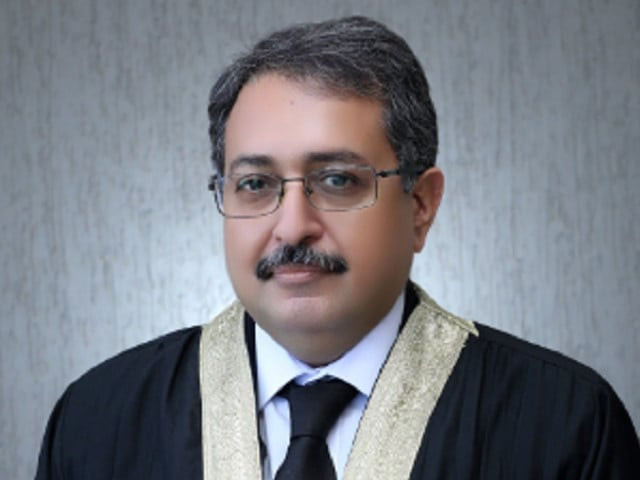IHC CJ to retain powers to form benches
States that additional registrar to seek his guidance about bench formation in his absence

The chief justice of the Islamabad High Court (IHC), Justice Aamer Farooq, has issued an office order, stating that in case of his unavailability, the court’s additional registrar judicial shall seek guidance from him with regard to formation of benches.
The chief justice has, however, clarified that the senior most available judge of the court can mark cases if the chief justice “is on any kind of leave”.
Justice Farooq issued this office order in response to a written order issued by IHC Senior Puisne Judge Mohsin Akhtar Kayani on November 3.
Read More: IHC grills govt over veracity of audio leaks
In the order, Justice Kayani had laid emphasis on regulating powers of the IHC chief justice, stating that in the absence of the CJ, the administrative judge cannot form benches to hear important matters, an aspect that puts some petitioners in a difficult situation.
The judge had ordered the IHC registrar office to place the matter before the court’s Administration Committee “to be resolved by way of informed decision by the Administration Committee or by the Full Court under the High Court Rules and Orders”.
While hearing the plea of a member of the PTI legal team, Sher Afzal Marwat, regarding grant of protective bail, Justice Kayani had referred to the powers defined in Chapter 10 (Miscellaneous) Part-A of “Rules for the Disposal of Executive and Administration Business” of the IHC.
Read More: Imran has no confidence in IHC chief justice: lawyer
He noted that according to the rule, the IHC’s administrative and executive work shall be controlled by a Committee of Judges to be known as the Administration Committee.
“[This will be the case] provided that those matters which are the exclusive concern of the CJ, namely, the constitution of benches and the appointment and control of the High Court Establishment shall be dealt with in accordance with such instructions as may from time to time be issued by the CJ”.
The judge stated that cases can only be marked by the administration judge on the basis of powers assigned by the CJ and no special powers have been extended to the administration judge for the constitution of any bench.
“Therefore, any case including instant petition to be fixed for same day or for that matter all other petitions, which were not entertained by the office including but not limited to pre-arrest bail, ad-interim protective bail, which could only be marked for next working day in absence of Hon’ble CJ, but Bench could not be constituted by the administration judge of this court.”
He stated that this aspect prime facie put the petitioner in a difficult situation, which relates to fundamental rights of an individual, who could not be given protection due to the absence of the CJ.
"Therefore, this matter be placed before the Administration Committee to be resolved by way of informed decision by the Administration Committee or by the Full Court under the High Court Rules and Orders.”
Recently, a full court of the Supreme Court upheld a piece of legislation—the Supreme Court (Practice and Procedure) Act, 2023—which aimed at regulating powers of the chief justice of Pakistan (CJP).
According to the law, the CJP is now supposed to consult a committee comprising two senior most SC judges for exercising original jurisdiction of the court and formation of benches.



















COMMENTS
Comments are moderated and generally will be posted if they are on-topic and not abusive.
For more information, please see our Comments FAQ